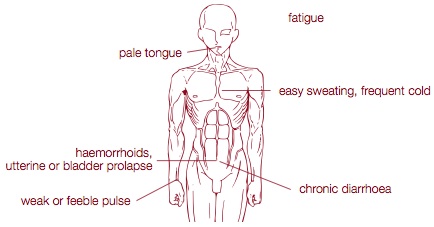GINSENG & ASTRAGALUS COMBINATION
Bu Zhong Yi Qi Tang
‘Tonify the Middle and Benefit qi Decoction’
Source: Treatise on the Spleen and Stomach (Pi Wèi Lun, 1249)
Keywords
chronic immune weakness, haemorrhoids, prolapse

Ingredients
Astragalus membranaceous (Huang Qi, astragalus)
Panax ginseng (Ren Shen, ginseng)
Angelica sinensis
(Dang Gui)
Atractylodes macrocephala (Bai Zhu, atractylodes)
Bupleurum chinense (Chai Hu, bupleurum)
Cimicifuga foetida (Sheng Ma, cimicifuga)
Glycyrrhiza uralensis (Gan Cao, liquorice)
Citrus reticulata (Chen Pi, citrus)
Major therapeutic action
Helps warm the body and aids digestion and symptoms such as anorexia, lethargy, postprandial abdominal
distension, sallow complexion, weak limbs, and loose stools.
Tonic, digestive stimulant, elevates and tones weakened or prolapsed structures, stimulates and protects the immune system.
Indications
* A very famous energy tonic, for chronic fatigue, weakness and listlessness, digestive weakness, chronic
diarrhoea and poor immunity and resistance.
* Excellent for strengthening the body and boosting the immune system in those prone to frequent colds or
infection. Useful for some presentations of chronic fatigue syndrome and post viral syndrome (see also
Xiao Chai Hu Tang). Also used to protect the immune system in patients undergoing chemotherapy or
radiotherapy.
* Elevates prolapsed organs, especially well for haemorrhoids, uterus and bladder prolapse.
* With the appropriate key symptoms, this formula can be used to treat biomedical conditions such as first
or second degree prolapse of the uterus, bladder or rectum, recurrent miscarriage, functional uterine bleeding, postpartum urinary incontinence, chronic hepatitis, corneal ulcers, pernicious anaemia, leucopoenia
and myasthenia gravis.
Key symptoms for use
* fatigue, weakness, generally run down
* frequent colds or infections
* loss of appetite
* loose stools or diarrhoea
* weakness in the limbs
* excessive daytime sweating
* pale complexion, pale tongue
* weak or otherwise feeble pulse
* With abdominal pain, add Gan Cao/Bai Shao.
* With abdominal bloating, add Zhi Shi & Jie Geng.
* For recurrent miscarriage with additional symptoms of lethargy, anorexia, and a weak pulse, combine with Shou Tai Wan.
The typical dose is three grams twice daily, before meals. In severe cases or the early stages of treatment (the first two weeks), a 50-100% increase in dose may be used, then reduced as the treatment takes effect.
Cautions and contraindications
This formula has an elevating tendency and in some patients can cause headaches or nausea. Some
patients with obvious digestive weakness may experience aggravation while taking this formula. A few
weeks of Huo Xiang Zheng Qi Tang may be used to clear the congestion before using this formula.
Avoid concurrent use with stimulants like coffee, chilli and cola drinks.
Contraindicated during the early phase of acute illness such as colds and flu, and for patients with symptoms of malar flush, afternoon fevers, feeling of heat in the palms and soles of the feet, night sweats,
Differentiation
Si Jun Zi Tang: The basic tonic formula. Best for generalised patterns of deficiency with symptoms of lethargy, loss of appetite, loose stools, and a weak pulse, and as the base for building numerous other energy
and Blood tonics. Excellent for children.
Gui Pi Tang: The main energy (and Blood) tonic formula for patterns accompanied by erratic behaviour,
‘dull’ eyes, insomnia or unusual bleeding or bruising with weak pulse.